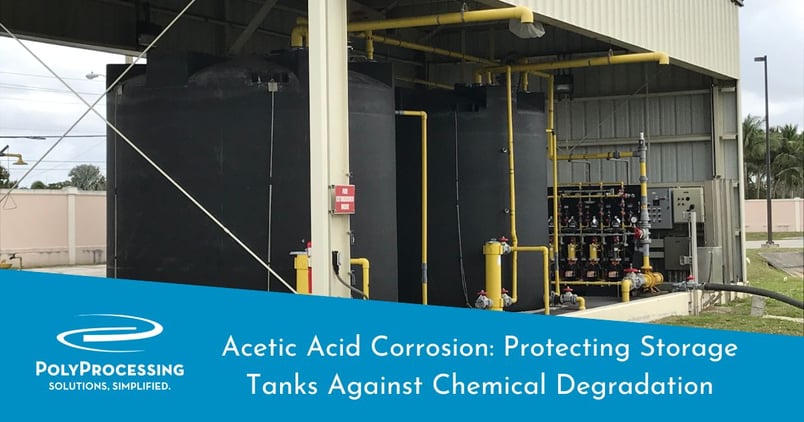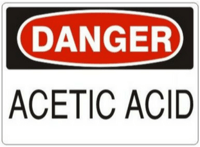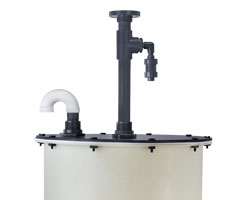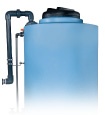Acetic Acid Corrosion: Protecting Storage Tanks Against Chemical Degradation
Acetic acid is a versatile, common chemical that’s used for a variety of purposes. The colorless liquid usually has a sour odor and can cause physical harm if it isn’t handled correctly. It is critical to ensure that you design a proper storage solution, because improper acetic acid storage can risk the health of the people who work near it.

Common Acetic Acid Applications
Acetic acid is used in various concentrations for a variety of purposes, including the following applications:
 Chemical compounds. Acetic acid is a chemical reagent in the production of a number of chemical compounds. It is mainly used in the production of vinyl acetate monomer, acetic anhydride, and ester production. Vinyl acetate monomer, or VAM, is a building block used in many industries to make paints, adhesives, and packaging.
Chemical compounds. Acetic acid is a chemical reagent in the production of a number of chemical compounds. It is mainly used in the production of vinyl acetate monomer, acetic anhydride, and ester production. Vinyl acetate monomer, or VAM, is a building block used in many industries to make paints, adhesives, and packaging.- Purifying organic compounds. In this application, acetic acid is used as a solvent for recrystallization.
- Medical use. The acid can be used as an antiseptic against pseudomonas, staphylococci, enterococci, streptococci and other bacteria. It’s also used in cervical cancer screening. The World Health Organization has listed acetic acid in its list of essential medicines.
- Household products. One of the most common forms of acetic acid is household vinegar, which is used in a large variety of common foods. Vinegar is typically 4-18 percent acetic acid by mass—a very weak concentration. Stronger solutions are highly corrosive and can be especially hazardous.
- Inks and dyes. The chemical is often used in the manufacture of inks and dyes.
- Perfume industry. Acetic acid is a common ingredient in manufacturing perfumes.
How to Store Acetic Acid Safely
The particular specifications of your acetic acid storage system will depend on the concentration of acetic acid being stored. The higher the concentration, the more difficult it can be to store acetic acid. Poly Processing tanks can effectively store acetic acid concentrations up to 80%.
Storage tank material
To meet the standards listed in our online chemical resistance guides, we highly recommend high-density cross-linked polyethylene (XLPE) storage tanks. XLPE tanks are more durable than other kinds of polyethylene tanks and give you a greater useful tank life.
SAFE-Tank double wall tank system
Poly Processing’s SAFE-Tank® double wall tank system is a "tank within a tank" that provides secondary containment to avoid damaging your equipment or property, loss of chemical, or injury to employees in the event of a spill. The tank is designed to keep contaminants from entering the interstitial space, so that any leaked chemical can still be used safely.
The SAFE-Tank Double Wall Tank System:
- Provides at least 110% secondary containment.
- Will equalize the liquid and allow the leaked chemical to be used until it is convenient to repair the tank.
- Is ideal for chemicals like sulfuric acid that can have dangerous exothermic reactions to water.
- Eliminates the expense, cost and maintenance of secondary concrete containment.
- Minimizes the system’s footprint by providing secondary containment in a more compact way.
Add a Bellows transition fitting to maximize your SAFE-Tank® system’s performance.
IMFO Tank System
If you already have sufficient containment designed in your chemical tank system, then the IMFO tank might be the right solution. Poly Processing’s Integrally Molded Flanged Outlet (IMFO®) Tank is a homogenous flange system that is molded as part of the tank while it is being manufactured, making the flange a stress-free part of the tank. The flange is created from the same material as the tank — it’s not an insert added during or post-production.
Advantages of the IMFO Tank include:
- Full tank discharge, because the flange is at the bottom of the sidewall, below the tank knuckle radius. There’s no need to enter the tank for cleaning.
- Enhanced long-term performance and fuller useful life of the tank since the flange doesn’t compromise the tank’s hoop integrity or structural design.
- Complete flange face protection is available in aggressive oxidation environments. The antioxidant OR-1000™ system can protect the discharge components from deterioration.
- Highest amount of static head pressure. The IMFO's design brings you the highest net positive suction head (NPSH) of any vertical non-coned tank on the market.
- Any required maintenance is simple and hassle-free. Unlike metallic inserts, the flange extends away from the tank wall and the entire flange system is external with easy hardware access from outside the tank.
Furthermore, you won’t have any chemical compatibility issues like the ones you may encounter with metallic inserts. If the chemical is safe in a crosslinked polyethylene tank, it’s safe discharging out of the IMFO system.
Chemical concentrations
Our online chemical resistance chart shows that all concentrations of acetic acid can be stored at up to 100 degrees F, but only less potent solutions can reach higher temperatures. Many of our fittings and gaskets give you excellent performance, and your specific application will determine the correct package for your needs.
Chemical fumes
Acetic acid emits corrosive fumes that can damage equipment, harm the environment and injure your employees. Poly Processing offers several products to scrub vapors from tanks by removing or neutralizing the fumes.

Poly Processing offers a cost-effective polyethylene chemical storage tank scrubber solution called PolyScrub™. As a wet scrubber, the PolyScrub system introduces water or a specific scrubbing solution through a submerged plenum. The fumes percolate up and through the scrubbing solution, then vent out of the top of the scrubber system.
PolyScrub Plus is our newest scrubber, which actively monitors and automates pH control to ensure maximum performance.
The Poly Processing Difference
As a highly corrosive and hazardous chemical, acetic acid needs to be properly handled and stored in storage tanks backed by a company that understands effective storage. With over 45 years of experience in storing acetic acid, we’ve developed storage solution options that use longer-lasting, more robust high-density cross-linked polyethylene.
Some tank manufacturers use linear polyethylene instead of cross-linked polyethylene because XLPE is more expensive to manufacture and more difficult for these larger systems. But we work to meet the highest possible standards.
Learn about designing your own acetic acid storage tank—contact a chemical storage tank expert today.
- May 3, 2024
- Topics: Chemicals
About Poly Processing
Posts By Topic
Tech Talk Podcast Episodes
Subscribe By Email
Recent Posts
- Why Cycling Causes Tank Failure: Tips for Prolonging Tank Life
- Small Changes in Tank Selection for Big Long-Term Cost Benefits
- NSF Certification vs. FDA Compliance: Understanding Chemical Tank Standards
- Why Chemical Storage Tank Wall Thickness Matters and How to Get It Right
- The Best of 2025 - Top 5 Chemical Storage Blogs
Tank Configurator

Find the recommended tank and system components for your chemical storage challenge.
Configure a Tank Package








